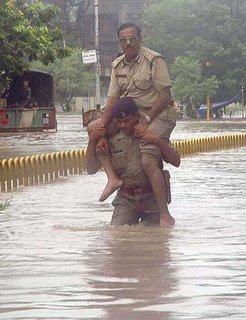A: Both decided to enlighten audiences with their insight into the 'indicators of fucked up life' of their countrymen.
Obama had famously claimed that small-town Americans "cling" to guns and religion and xenophobia out of bitterness over lost jobs.
Amit, following in Obama's footsteps, has explored the reason why Orissa villagers find hope in superstition, take up guns and join Naxalism.
Ok, my question to you: What does the Jagannath Turtle have in common with Naxalism?Amit's explanation of Orissa villagers' superstition is even more sublime than Obama's:Answer: They are both indicators of the fucked-up lives of so many of the people of rural India. There is no development, there is little chance of upward mobility, there is often no law and order. Their lives are so screwed that they actually derive hope from a turtle that they think is Lord Jagannath. How sad is that?
So, according to Amit, the Orissa villagers are superstitious because of lack of development, abject poverty, no chance of upward mobility due to lack of opportunity, absence of law and order etc.
But while we crush the Naxalites and go WTF over the turtle worship, it makes sense to remember why people give in to such madness. It is because of how abject their lives are. And if we don’t sort that out, we’ll have more batches of Naxalites after this one is dealt with, and more turtle gods. (A leech deity makes much more symbolic sense, actually.)
Now some of us - the types who constantly mistake correlation for causation, might ponder over questions, such as, why, despite not lacking any of the aforementioned afflictions such as poverty, lack of opportunity etc. do most urban Indians follow all sorts of superstitious practices; from idol worship to numerology? Why do toasted bread slices bearing Jesus like silhouette sell for thousands of dollars on eBay in the US, a developed country which to my knowledge provides law and order and opportunities for its citizens?
May be it is a trait peculiar to us, who mistake correlation for causation, to wonder, how, without any mention of Naxalism in the Reuters report, did Amit find out about Naxal activity in the area. Especially when the map of Naxal affected districts clearly shows that the eastern coast of Orissa (Kendrapara is just northeast of Bhubaneshwar) is not affected by Naxalism. It may be that those of us who do not go about applying a standard template to every situation and spit out posts, wasted our time by pausing upon reading that the villagers thought of the turtle as Lord Jagannath; not some tribal God. We obviously should not have read, let alone trusted, those loony leftist bleeding heart blogs when they told us that Naxals are mostly tribals who do not worship the standard Hindu Gods.
I think, however, my skepticism is getting the best of me. Being an atheist and a rationalist shouldn't I be heartened by Amit's logic? If the reason "why people give in to such madness" is how abject their lives are, then all we have to do is wait for material prosperity. It is sure to wipe out the scourge of religion and superstition once and for all.
No?

